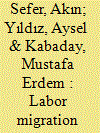| Srl | Item |
| 1 |
ID:
178036


|
|
|
|
|
| Summary/Abstract |
Although mountainous regions remained relatively isolated and almost untouched by the Ottoman rule, labor migration connected the inhabitants of these regions to the socioeconomic and political processes in the Ottoman Empire and beyond. Kruševo, a highland village located in present-day North Macedonia, provides an excellent case for understanding these connections. This paper presents systematic evidence from the Ottoman archives to document and analyze the social, economic, and demographic impacts of labor migration during this period. It provides an in-depth analysis of the Ottoman population and tax records of Kruševo in the 1840s, demonstrating the occupational profiles, migration patterns, and family and neighborhood networks of village residents during this period. Based on this analysis, it argues that labor migration was key to the transformation of social, economic, and demographic relations in rural communities and to the integration of even the most remote highland villages with the modernization processes that characterized the Ottoman Empire in the 19th century.
|
|
|
|
|
|
|
|
|
|
|
|
|
|
|
|
| 2 |
ID:
151858


|
|
|
|
|
| Summary/Abstract |
In the mid-nineteenth century pan-Slavic ideology was evident at two levels: at the personal level in N.P. Ignatiev's diplomacy, and at the institutional level in the Slavic Benevolent Committee's activities. Both served to spread Russian influence among the Slavic Orthodox subjects of the Ottoman Sultan. The Russian Archives contain a wealth of material related to the Slavic Benevolent Committee and Ambassador N.P. Ignatiev's activities concerning Russia's Balkan policy. The memoirs of the Russian and Ottoman bureaucratic elites also offer great detail on the subject. Relying upon these archival sources and memoirs, this article aims to discuss the transformation of pan-Slavic ideology from a cultural organization into a Russian political asset, with special attention to N.P. Ignatiev and the Slavic Benevolent Committee.
|
|
|
|
|
|
|
|
|
|
|
|
|
|
|
|